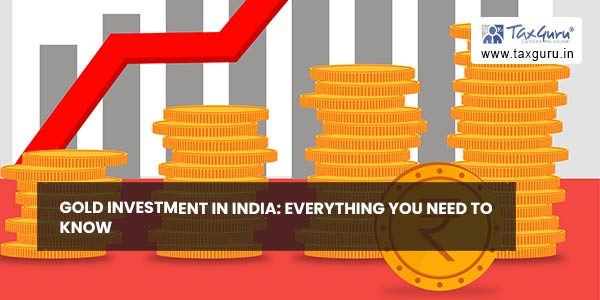#AD
One of the most popular investments in India is gold. Its strong selling advantages include high liquidity and the ability to overcome inflation, charm, prestige, and other qualities. When the markets are turbulent, gold prices soar.
Even if there are times when gold prices fall in the markets, these periods are brief, and gold prices always make a robust recovery. Here is what you need to know.
What is Gold Investment?
Spending money with the expectation that it will generate greater income later on is known as investing. Investments can get quite complex, but the act itself is rather straightforward.
Investments can be made in anything that has the potential to appreciate over time. Although gold’s price varies in the near term, it has greatly exceeded other asset classes over the long term, including equities, inflation, and real estate.
For Gold investment, it is very important to check Gold Rate Prediction to get benefits out of Short Term & Long Term investment.
When someone invests in gold, they buy a quantity of real, pure gold and either keep it themselves or store it in authorized storage facilities.
Types of Gold Investment
You can invest in gold either in its physical or digital form. As an investment, gold can be held in its physical form as jewelry, coins, bars, bullion, etc. The following are some significant drawbacks of purchasing actual gold:
- Making/design fees make the purchase price go high.
- Due to potential contaminants and the requirement of source and purity certificates, selling is inconvenient.
- Because of the need for security and insurance, storage costs may apply.
You can choose the digital option, which includes products like Digital Gold, Gold ETFs, Gold Mutual Funds, and Sovereign Gold Bonds, to get around the constraints of physical gold.
1. Gold ETFs: The principal underlying assets of Gold Exchange Exchanged Funds, which are traded on stock exchanges similarly to shares, are Physical Gold and Stocks of Gold Mining/Refining Companies. Having a DEMAT (Dematerialized) Account is required to purchase Gold ETFs.
2. Digital Gold: These are available for purchase through a variety of apps in quantities ranging from 1 gram and above.
3. Sovereign Gold Bonds: The Reserve Bank of India (RBI) periodically issues these bonds, which are accessible for purchase through eminent banking sectors. Although the GOI guarantees the returns and links them to the price of gold, the underlying asset for such returns is not physical gold.
4. Gold Mutual Funds: These are mutual funds that invest primarily in Gold ETFs and are managed by different asset management companies (AMCs).
Benefits Of Gold Investment
Following are the benefits of investing in gold:
1. Less Risky: Investment in gold protects your capital from risk and helps to maintain it, making it useful during difficult economic times like today. Investors scramble to add gold to their portfolios whenever significant political events shake the economy or banks appear wobbly on their foundations, as they want to help ensure they still have a firm foundation from which to make investments. Therefore, gold is a wise investment in erratic and unreliable times.
2. Stable Value: The value of gold is multifaceted. It’s limited and extremely unusual. Additionally, it is quite stable and has a very long shelf life without corroding or deteriorating. While new gold is frequently mined much of which is consumed for industrial or jewelry uses. This implies that there will never be enough gold for neither everyone nor that the gold that is now in existence will degrade or vanish. There is intrinsic value in physical gold. As a result, unlike stocks or virtual money, its value can never go to zero.
3. Inflation Resistant Investment: One of gold’s main benefits, despite price fluctuations, is that it can protect your money from inflation. When interest rates continue at historic low levels, most bank accounts do not experience a genuine increase in value. Directly in opposition, gold maintains its value over time, thus regardless of the pace of inflation; you can still trade it for a consistent quantity of money.

Drawbacks Of Gold Investment
Following are the disadvantages of investing in gold:
1. Liquidity: Gold investing requires patience; while it is a good long-term investment, you should be aware that it also makes a good short-term money storage solution. Additionally, a dealership or gold investment company takes a share when you buy real gold from them. This implies you must pay a little more than the item’s fair market worth. If you want to sell it, the same thing takes place.
2. Low Returns: Benefits of gold investments may be notable for long-term use. Having said that, this commodity might not produce a return on investment every month or every year like real estate, the stock market, or certificates of deposits do. Only by reselling the gold you already have can you make money. Investing in gold is not the best strategy to increase your wealth.
Conclusion
Gold has proven to be beneficial in times of deflation and inflation. This metal has maintained its value not just in the past but also in the present. If you invest in it intending to create a long-term store of worth, future generations will remember you for it.




